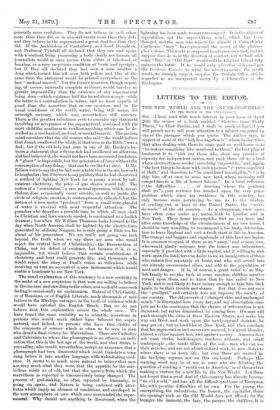LETTERS TO THE EDITOR.
THE NEW WORLD AND THE " NE'ER-DO-WEELS."
[TO THE EDITOR OF THE "SPECTATOR?) SIR,-I have read with much interest in your issue of April 26th the review of a book entitled "Sketches from Shady Places," by Thor Fredur, and I shall be much obliged if you will permit me to call your attention to a subject suggested by one of the passages which you quote. The author says, in respect of some of the "helpless vagabonds whom he describes, that after dealing with them in some gaol or workhouse so as " to restore something like manhood to them," the best plan of treatment is to "pick out those who show any promise of capacity for independent action, and pack them off to a land where circumstances render' mouching 'impossible ;" and, again, "the best thing to be done with such a person" (" twice convicted of theft," and therefore to "be considered incorrigible,") "is to ship him off at once to some new land, where necessity will compel him to a life of honest labour." In a brief reference (" the difficulties of deciding where the penitent shall go "), your reviewer has touched upon the very grave problem which, since my residence in this country, has only become more perplexing to me, as to the wisdom of sending out, at least to the United States, the " neer- do-weels " of the old country.. As a clergyman, such cases have often come under my notice, both in London and in New York. These home incorrigibles find me out here, and after some knowledge of the circumstances of my new home, I should be very unwilling to recommend a too hasty determina- tion to leave England and seek a fresh start of life in America. The tramps and beggars and vagabonds of this land are legion. It is common to speak of them as an "army," and serious men, who would gladly welcome here the honest and industrious, especially if provided with a little capital, and if willing to seek work upon the land, have no desire to see an immigration of these who cannot live reputably at home, and who will crowd Into our already overcrowded cities, and add to the population 'of need and danger. It is, of course, a great relief to an Eng- lish family to see the back of some careless, shiftless member turned upon them, and to know that he has sailed to New York, and is not likely to have money enough to take him back again, to be their trouble and shame. But that does not save the "prodigal," and certainly does not improve the society of our country. The old proverb of" changed skies and unchanged minds" is illustrated here every day, and my observation com- pels me to the conclusion that the chance of reformation is not increased, but rather diminished, by coming here. Ifs man will push through the cities of these Eastern States, and make his way out West, and work upon the newly-opened districts, he may get on ; but to land him at New York, and then conclude that his regeneration and success are assured, is a great blunder, almost a crime against him, and against society. America does not want clerks, book-keepers, teachers, artisans, and small tradespeople ; she needs tillers of the soil,—men who can use their muscles, and are not afraid of hard work, in new districts where there is no town life ; but even these are wanted in the far-lying regions, not on this sea-board. Perhaps this warning word may be of use to some who are debating the question of sending a "youth out to America," or of themseldes making a Venture for a new life in the New World. Let them not forget that a good deal of this country has already become "an old world," and has all the difficult problems of European life, with peculiar difficulties of its own. For the young, the enterprising, the industrious, the honest, the capitalist, there are openings such as the Old 'World does not afford ; for the lounger, the immoral, the lazy, the panper,ithe 'shiftless, it is
only a lower deep than that to which they have already sunk.— I am, Sir, &c.,



































 Previous page
Previous page